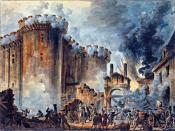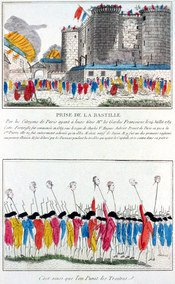The French Revolution was a time of great change. There is debate over whether nationalism should be suppressed. Nationalism is defined as devotion and loyalty to one's own country while suppression is synonymous with subdue or stifle. A revolution is an overthrow or thorough replacement of an established government or political system by the people being governed. Political conformity, autocracy and status quo are all values held by those who are of the opinion that nationalism should be suppressed. People who believe that nationalism should not be suppressed value human rights, democracy and political freedom. Nationalism should never be suppressed.
A case study that supports this view is the storming of the Bastille. Someone who would support this position is Locke because he valued the right to rebel against an unfit leader. By standing up for their rights and not allowing themselves to be held down by the inequality of the Old Regime, the people who stormed the Bastille helped to bring about great change in France.
It is evident in that the fall of the Bastille proves that nationalism should not be suppressed because it was one of the first times in history that people of a country came together to fight against the injustice of an absolute ruler. The fall of the Bastille symbolized how nationalism displayed by the French people loosened the grasp that the monarchy had on the country. Some people may argue that nationalism should be suppressed because it leads to outbursts of radicalism and violence and a monarch provides stability. However, this idea is wrong because if violence is not used the people are ignored and are not taken seriously. The storming of the Bastille was one of the early expressions of nationalism in the French Revolution. This demonstrates that nationalism should never be...


